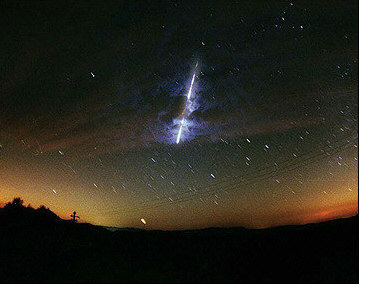Meteor ‘Outburst’ Expected Friday Morning

Yahoo News reports that this summer’s Perseid shower will be exceptional. The moon is mostly out of the way later in the night, and higher-than-normal activity rates are expected over the United States.
A few Perseid Facts….
Perseid meteoroids (which is what they’re called while in space) are fast. They enter Earth’s atmosphere (and are then called meteors) at roughly 133,200 mph (60 kilometers per second) relative to the planet. Most are the size of sand grains; a few are as big as peas or marbles. Almost none hit the ground, but if one does, it’s called a meteorite.
Comet Swift-Tuttle, whose debris creates the Perseids, is the largest object known to make repeated passes near Earth. Its nucleus is about 6 miles (9.7 kilometers) across, roughly equal to the object that wiped out the dinosaurs.
Back in the early 1990s, astronomer Brian Marsden calculated that Swift-Tuttle might actually hit Earth on a future pass. More observations quickly eliminated all possibility of a collision. Marsden found, however, that the comet and Earth might experience a cosmic near miss (about a million miles) in 3044.
When a Perseid particle enters the atmosphere, it compresses the air in front of it, which heats up. The meteor, in turn, can be heated to more than 3,000 degrees Fahrenheit (1,650 Celsius). The intense heat vaporizes most meteors, creating what we call shooting stars. Most become visible at around 60 miles up (97 kilometers). Some large meteors splatter, causing a brighter flash called a fireball, and sometimes an explosion that can often be heard from the ground.
















Ok you see, its too early for me to actually wake up. So I’ll have to stay up all night lol. It sounds awesome, I can’t miss it.
-Laura
This sounds very interesting. One of these days I’m gonna invest in a good
Telescope! However, with all the trees around here, my field of vision is not
so good!
How do we protect earth from meteors??